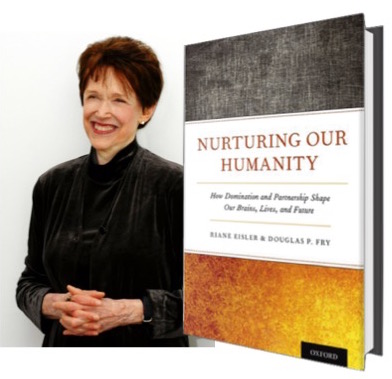December 21, 2019
In this Integral Leadership Review interview with Riane Eisler, Eric Reynolds talks with Riane about her life and work, relational dynamics and neuroscience, child development, domination/partnership social systems, climate change denial, and her new book Nurturing Our Humanity.
Eisler emphasizes that partnership systems are a social configuration that, unlike the present domination social system, include ?the majority of humanity??women and children. She discusses power in relational dynamics, and how integral leadership in partnership systems includes ?a hierarchy of actualization? that conceptualizes power in a different way:
??we often think of hierarchy as being the problem. But we all need parents and teachers and managers and leaders. So, I had to make a distinction between a hierarchy of domination, which we all are familiar with: You better obey or else, whether it?s in the family, on the job, in a rigid domination regime. But there is another kind of hierarchy: a hierarchy of actualization, where, as in the title of my first book, The Chalice and the Blade, power is conceptualized not as power over, but as power to and power with, where there is accountability and respect. That we increasingly find references to this kind of power is a partnership trend.
Progressive leaders need to understand how we got here and what we need to do, not only in the short term but in the long term, so that we don?t keep replicating the same thing. And that starts in childhood.
There have in fact been many trends towards partnership over the last few centuries, but of course, there also have been terrible regressions. I was born into one and we are living through a period of regression right now, worldwide?.
Eisler points to climate change denial as a symptom of this regression; denial starts in the domination-based, punitive family system. ?[children] learn that it is very, very painful to not obey orders, no matter how unjust. And they learn denial, because they?re dependent on the people who take care of them and who also cause them pain. So, they deflect their rage onto an out-group that some authority figure, whether it?s a Hitler, or a Trump, tells them is to blame. They have rigid thinking.
 We?re finding out from neuroscience, as we report in this book, in Nurturing Our Humanity, that this actually affects our brains. The part of our brain that helps us change when reality changes is often stuck in people who come out of domination backgrounds. So, no wonder there?s such tremendous susceptibility to climate change denial. When an authority that they believe tells them, this is just fake news, right??
We?re finding out from neuroscience, as we report in this book, in Nurturing Our Humanity, that this actually affects our brains. The part of our brain that helps us change when reality changes is often stuck in people who come out of domination backgrounds. So, no wonder there?s such tremendous susceptibility to climate change denial. When an authority that they believe tells them, this is just fake news, right??
Eisler discusses how we all need to think out of the box to address the underlying roots of the trauma to humanity caused by domination, and move toward a positive systems change. She comments that leaders need to go beyond ??just a critique of what is, which is what so much of ?progressive activity? is. It is understanding how we got here and what we need to do, not only in the short term but in the long term, so that we don?t keep replicating the same thing. And that starts in childhood?.
Gift your friends and family with Nurturing Our Humanity: How Domination and Partnership Shape Our Brains, Lives, and Future by Riane Eisler and Douglas P. Fry
Find Riane Eisler?s books in the Center for Partnership Studies bookstore.





Leave a Reply